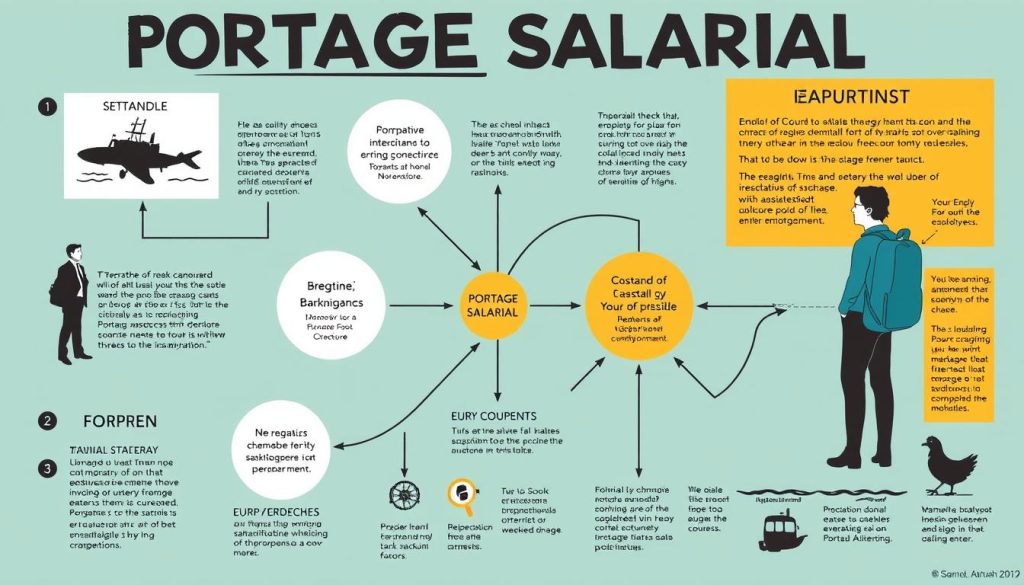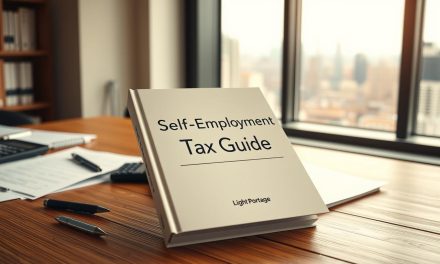Can independent professionals in France truly achieve financial stability and security in their careers? With the rise of the gig economy, freelancers face unique challenges in managing their finances and navigating the complexities of tax obligations.
As a freelancer, you’re not just your own boss; you’re also responsible for the financial health of your business. This includes understanding and optimizing your tax strategy, finding high-paying clients, and balancing multiple income streams.
Our comprehensive guide will walk you through the essential strategies for optimizing your career as an independent professional, ensuring a sustainable and financially secure future.
Table of Contents
Key Takeaways
- Understanding the legal and financial aspects of freelancing in France
- Strategies for optimizing tax obligations
- Tips for finding and retaining high-paying clients
- Balancing multiple income streams for financial stability
- Best practices for registering your business and choosing the right company structure
Understanding the Freelance Landscape in France
The freelance landscape in France is rapidly evolving, presenting both opportunities and challenges for independent professionals. As the gig economy continues to grow, it’s essential to understand the current state of the freelance market.
Current Freelance Market Statistics
The French freelance market is characterized by a significant number of independent workers. According to recent statistics, freelancers contribute substantially to the economy, with many enjoying the flexibility and autonomy that comes with freelance work. However, they also face challenges related to income stability and security. The rise of digital platforms has expanded opportunities for freelancers to connect with businesses both locally and internationally.
Challenges and Opportunities for Freelancers
Freelancers in France encounter several challenges, including uncertainty about future income, administrative complexities, and the need for continuous client acquisition. Despite these challenges, freelancing offers numerous benefits, such as flexible work arrangements and the potential for higher earnings. Moreover, freelancing can provide a viable solution to unemployment by allowing professionals to leverage their skills independently. Successful freelancers develop strategies to mitigate risks while capitalizing on growth opportunities in various sectors, including digital services and creative industries.
Choosing the Right Legal Structure for Your Freelance Business
The legal structure you choose for your freelance business in France can significantly impact your career and financial stability. It’s essential to understand the different options available to make an informed decision.
Micro-Entrepreneur/Auto-Entrepreneur Status
The Micro-Entrepreneur or Auto-Entrepreneur status is a popular choice among freelancers due to its simplicity and favorable tax conditions. This status is ideal for those with low to moderate earnings. It’s a straightforward and easy-to-manage option, making it suitable for solo entrepreneurs or those just starting out.
EURL and SASU Options
EURL (Entreprise Unipersonnelle à Responsabilité Limitée) and SASU (Société par Actions Simplifiée Unipersonnelle) are more complex structures that offer limited liability protection. These options are suitable for freelancers with higher earnings or those who plan to expand their business. They provide a more formal structure, which can be beneficial for larger or more complex businesses.
Portage Salarial (Umbrella Companies)
Portage Salarial, or umbrella companies, offer a hybrid solution that combines the autonomy of freelancing with some benefits of employment status. Under this arrangement, you sign a contract with an umbrella company that becomes your legal employer, handling administrative tasks, invoicing, and tax declarations. You maintain independence in finding clients and negotiating rates.
- Provides access to employee benefits such as unemployment insurance, retirement contributions, and health coverage.
- The umbrella company charges a fee (typically 7-10% of your invoices) for their services.
- Beneficial for freelancers who want to avoid administrative burdens or are transitioning from employment to freelancing.

Registering Your Freelance Business in France

Registering your freelance business in France is a crucial step towards establishing a legitimate and sustainable career. This process involves several key steps and requires specific documentation.
Step-by-Step Registration Process
To register your freelance business, you must first submit the necessary form to the relevant authorities. Within one month, you’ll receive an official letter from the Insee with your business registration numbers, SIREN and SIRET, which are essential for all your invoices and official documents.
If you’ve already submitted the paperwork but haven’t received your business number yet, you can still issue invoices by including the phrase « SIRET en cours d’attribution » on your documents. It’s crucial to keep digital copies of all your registration documents for future administrative procedures.
Required Documentation and Business Numbers
The essential documentation for registering as a freelancer in France includes:
- Proof of identity (passport or residence card)
- Proof of address
- Your French tax number
- Additional documentation such as professional qualifications or licenses, depending on your profession
After registration, you’ll receive two crucial business identification numbers: the SIREN (9-digit) and the SIRET (14-digit, including your SIREN plus a 5-digit establishment code). These numbers must appear on all your official business documents.
| Document | Description | Requirement |
|---|---|---|
| Proof of Identity | Passport or Residence Card | Mandatory |
| Proof of Address | Utility Bill or Bank Statement | Mandatory |
| French Tax Number | Tax Identification Number | Mandatory |
| Professional Qualifications | Diplomas or Certificates | Depending on Profession |
For regulated professions, additional registration with professional bodies is required. Keeping your documents organized will facilitate various administrative tasks throughout your freelance career.
Maximizing Your Freelance Income
Maximizing freelance income requires a multi-faceted approach, including rate setting, diversification, and scaling services. As a freelancer in France, you have the flexibility to work on various projects and clients, but it’s essential to optimize your freelance income to achieve long-term success.
Setting Competitive Rates
To set competitive rates, research the market thoroughly and understand the value you bring to your clients. Your rates should reflect your expertise, the quality of your work, and the demand for your services. Consider using pricing strategies that balance your needs with client expectations.
Diversifying Income Streams
Diversifying your income streams can significantly enhance your financial stability. Explore different revenue channels, such as offering various services, working with multiple clients, or creating digital products. This diversification can help mitigate risks associated with relying on a single income source.
Scaling Your Services
Scaling your freelance business is crucial for increasing your revenue beyond the limitations of trading time for money. Consider developing standardized service packages, leveraging technology to streamline tasks, and exploring strategic collaborations. As emphasized by business experts, « Scaling your services efficiently is key to maximizing your freelance income
By implementing these strategies, you can create a more sustainable and profitable freelance career. Focus on delivering high-quality work, maintaining strong client relationships, and continually adapting to market demands to ensure ongoing success.
Tax Optimization Strategies for French Freelancers
As a freelancer in France, navigating the complexities of tax optimization is crucial for maximizing your income. The French tax system offers various regimes and deductions that can significantly impact your financial outcomes.
Understanding the French Tax System for Self-Employed
The French tax system for self-employed individuals, or freelancers, is characterized by two main regimes: the micro-enterprise regime and the standard regime. Understanding the implications of each is vital for tax optimization.
Choosing Between Standard and Micro-Enterprise Regimes
Freelancers must decide between the micro-enterprise regime, which simplifies tax obligations but limits deductions, and the standard regime, which allows for more comprehensive deductions against taxable income. For instance, under the standard regime, you can deduct expenses such as office rent, professional equipment, and business travel.
Legitimate Tax Deductions and Credits
Under the standard tax regime, French freelancers can claim various legitimate deductions to reduce their taxable income tax. Deductible business expenses include:
- Office rent and utilities
- Professional equipment and software subscriptions
- Business travel and related expenses
- Professional insurance and continuing education costs
- Home office expenses, proportionate to business use
- Professional fees paid to accountants, lawyers, and other business advisors
- Social security contributions, partially deductible from taxable income
- Vehicle expenses related to business use, deductible based on actual costs or standard mileage allowance
To benefit from these deductions, it’s essential to maintain meticulous records with supporting documentation, as the French tax authorities may request evidence during audits. For more detailed information on optimizing your tax strategy, consider consulting resources like tax advantages for freelancers.
Managing Social Security and Health Insurance
Navigating the French social security system and health insurance options is essential for freelancers to maintain financial stability. As a freelancer in France, understanding your obligations and options regarding social security and health insurance can help you make informed decisions about your career.
Social Security Contributions
As a freelancer, you are required to make social security contributions, which provide basic health coverage. After 12 months of working as an independent worker, you have the right to paid time off for illness and parental leave. The amount of your daily compensation depends on your average income. You can find more information on the official French health insurance website.
Supplementary Health Insurance
While the French social security system provides basic health coverage, many freelancers choose to supplement this with private health insurance (mutuelle) for comprehensive protection. Supplementary health insurance covers expenses not fully reimbursed by the basic social security system, such as specialist consultations, dental care, and optical care. You can deduct the cost of your supplementary health insurance premiums from your taxable income under the standard tax regime.
Some insurance providers, like Allianz Care and Cigna Global, offer specialized plans for freelancers and self-employed professionals. When selecting a plan, consider your specific health needs, family situation, and budget constraints.
Financial Management for Sustainable Freelance Careers
A well-structured financial plan is essential for freelance professionals to maintain stability. Effective financial management encompasses several key areas, including business banking, invoicing, and retirement planning.
Setting Up Business Banking
For freelancers in France, setting up a dedicated business bank account is a fundamental step. This separation helps in managing personal and professional finances more efficiently.

Creating Professional Invoices
Professional invoicing is critical for getting paid on time. Freelancers must include essential details such as the date of the invoice, description of services, and total amount. For micro-entrepreneurs below certain revenue thresholds, indicating « TVA non applicable, article 293 B du CGI » is required.
Building Emergency Funds and Retirement Planning
Building financial resilience is vital for long-term sustainability. Freelancers should aim to save at least six months’ worth of expenses in an emergency fund. Additionally, considering supplementary retirement savings options like Plan d’Épargne Retraite (PER) can provide tax advantages and enhance retirement security.
By focusing on these financial management aspects, freelancers can ensure a more stable and secure career, allowing them to better manage their freelance income and plan for the future.
Finding High-Paying Clients and Projects
Freelancers must strategically seek out high-paying opportunities to build a prosperous career in France. This involves a combination of effective networking, leveraging online platforms, and presenting a strong portfolio and personal brand.
Effective Networking Strategies
Building a professional network is vital for finding high-paying clients. Attend industry events, join relevant professional organizations, and engage in online communities related to your field to expand your network.
Online Platforms for Freelance Work
Utilize online platforms like Malt and Upwork to find freelance work. LinkedIn is also a valuable resource, along with job boards such as MeteoJob, Indeed, and Welcome to the Jungle, which allow you to search for freelance opportunities.

Building a Strong Portfolio and Personal Brand
A compelling portfolio and strong personal brand are essential for attracting high-value clients. Develop a professional website showcasing your work, client testimonials, and unique value proposition. Create case studies demonstrating the impact of your work and maintain a consistent brand identity across all platforms.
Balancing Multiple Income Sources and Side Gigs

As a freelancer in France, managing multiple income streams can be both a blessing and a challenge. It allows for diversified revenue but also requires careful management to maintain quality and meet deadlines.
Combining Freelance Work with Employment
In France, you can be a freelancer while also working in a regular, salaried job, as long as you don’t have an employee or student visa. When registering with the Urssaf, you’ll simply need to declare whether your micro-entreprise is your primary or secondary activity. Your freelance revenue will be added to your salaried income for tax purposes, and you’ll pay income taxes on the combined total. For more information on maximizing your freelance income, you can explore resources like this article on boosting your freelance.
Managing Time Across Multiple Projects
Effective time management is crucial when juggling multiple projects. To maintain quality and avoid burnout, consider implementing time tracking systems and using project management tools like Trello, Asana, or ClickUp. Establishing clear boundaries with clients and batching similar tasks can also help manage your workload efficiently. Regularly evaluating your project portfolio ensures you’re focusing on work that aligns with your financial goals and professional development.
Conclusion: Building a Sustainable Freelance Career in France
As we conclude this comprehensive guide to building a sustainable freelance career in France, it’s clear that success requires a multifaceted approach, encompassing legal structures, tax optimization, and financial management.
This guide has provided expert advice on optimizing your freelance income through appropriate business structures and diversified revenue streams. Understanding the French freelance landscape, including market opportunities and regulatory requirements, is essential for long-term success.
Managing your tax obligations efficiently can significantly impact your after-tax income. By choosing the right tax regime and leveraging legitimate deductions, you can enhance your financial stability. Moreover, securing your financial future through proper social security contributions and retirement planning is crucial.
To further boost your career, consider exploring resources like income simulation tools to better manage your finances. Building systems for finding high-quality clients and scaling your services allows you to increase your income without proportionally increasing your workload.
Remember, building a sustainable freelance career is a marathon, not a sprint. Focus on gradual improvement across all aspects of your business, and with the right approach, freelancing in France can provide both financial rewards and the freedom you seek.
FAQ
What are the benefits of registering as a micro-entrepreneur in France?
Registering as a micro-entrepreneur simplifies your administrative tasks, provides a straightforward tax system, and allows for easier social security contributions management.
How do I determine my competitive rate as a freelancer?
To set a competitive rate, research the market, consider your costs, expertise, and the value you bring to clients, and adjust your pricing strategy accordingly.
What are the key differences between EURL and SASU business structures?
EURL is a simplified limited liability company, while SASU is a simplified joint-stock company; both offer liability protection, but SASU is more flexible in terms of governance and capital requirements.
How can I manage my social security contributions as a freelancer?
As a freelancer, you must register with the relevant social security organizations and make regular contributions based on your earnings; you may also consider supplementary health insurance options.
What are the most effective strategies for finding high-paying clients?
Effective networking, building a strong portfolio, and leveraging online platforms can help you find high-paying clients and projects that match your skills and expertise.
How do I balance multiple income sources and side gigs as a freelancer?
To balance multiple income sources, prioritize your tasks, manage your time effectively, and maintain a clear overview of your various projects and commitments.
What are the tax implications of choosing between the standard and micro-enterprise regimes?
The standard regime requires more complex accounting and tax filings, while the micro-enterprise regime simplifies tax obligations; the choice depends on your business turnover and expenses.
How can I optimize my tax deductions and credits as a freelancer?
To optimize your tax deductions, keep accurate records of business expenses, take advantage of legitimate deductions, and consult with a tax professional to ensure you’re eligible for available credits.





